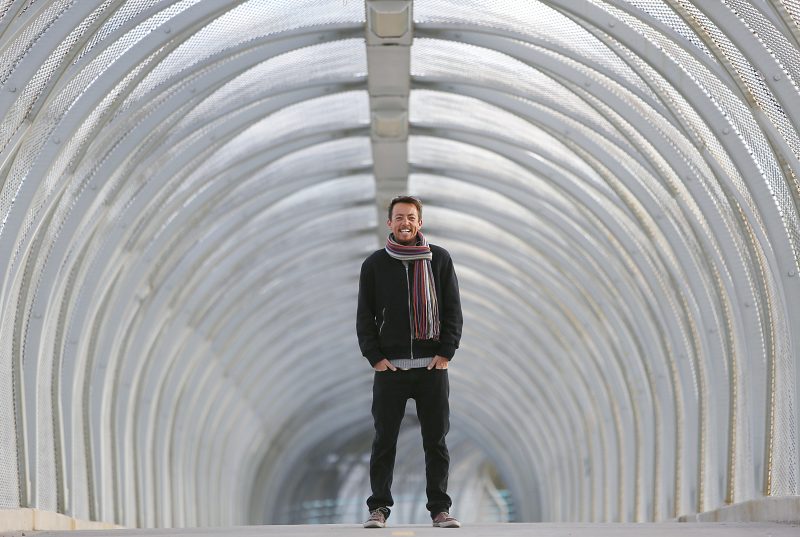4 Poems to Celebrate Nonbinary Identity
TC Tolbert pictured above
Now more than ever, there’s a growing awareness that gender falls on a spectrum. According to a new study, more than one million Americans identify as nonbinary, and Merriam-Webster added the singular “they” pronoun to its dictionary in 2019. Though nonbinary and genderqueer identities are complex and ever-evolving, the term “nonbinary” generally refers to genders outside of male and female. These four poems validate and revere people beyond the binary.
1. “My Melissa,” by TC Tolbert
TC Tolbert is a feminist and genderqueer poet. Tolbert has been awarded an Academy of American Poets’ Laureate Fellowship for their collaboration with trans and queer people as Tucson’s Poet Laureate. In “My Melissa,” Tolbert reclaims their birth name, creating a vivid and imaginative self-portrait of an ever-changing trans body. Throughout the poem, anatomical become increasingly creative and playful: Melissa’s “trans articular cartilage is string light threaded through the rafters,” while “trans erythrocytes are dapples of daylight / drug against a concrete block wall.”
In addition to reflecting self-love and self-acceptance, the poem is a celebration of fluidity and how it will continue to shape the speaker’s future: “I love you time, how trans you are. / Your trans boredom, ribbon-sharp and meadow-bold. You, whose bark is / trans; whose recovery, whose lumen, whose partial pressure / (trans), in order to live, must continue to respond to changes in the lungs.”
2. “Dream Ending in a Host of Angels Zipping Me into My Grandmother’s Dress” by Bradley Trumpfheller
A current fellow at the Michener Center for Writers, Bradley Trumpfheller is an emerging trans voice. Their debut collection, Reconstructions, revolves around the central question: “What does the body, in language, amount to?” In “Dream Ending in a Host of Angels Zipping Me into My Grandmother’s Dress,” Trumpfheller once again considers this inspiration, creating a nostalgic, joyful trans landscape in which the speaker melds both their identity and rich family tradition.
“Trust / you’re not from this sweat but still a goodness. You once most / only boy in the yard, laugh into your born polish,” writes Trumpfheller. “Step-joy / uncousin: home is a name you bless in silk & cinch. Believe / we’re all alive here. Come hum this lace-blood warm. Glisten.”
3. “Publick Universal Friend Contends with Orthography & Meditates in an Emergency” by Day Heisinger-Nixon
Day Heisinger-Nixon is a nonbinary poet and writer whose work addresses transness, disability, and chronic illness. In 2020, they were nominated for a Pulitzer Prize for a poem from their series about Publick Universal Friend, an 18th century Quaker preacher originally named Jemima Wilkinson who underwent a severe illness. After this illness, Publick Universal Friend claimed to have been reborn and resisted binary gender identity. Through their Publick Universal Friend series, Heisinger-Nixon explores their own identity and gender queerness as a whole. In “Publick Universal Friend Contends with Orthography & Meditates in an Emergency,” specifically, Heisinger-Nixon portrays this figure as beautiful, joyful, and craving connection, both admiring Publick Universal Friend and depicting them as deeply, universally human.
“It is easy to be beautiful / it is difficult to appear / so,” reflects Heisinger-Nixon. “Do I need to appear / so [sic] absent-minded as / I wander about out on summer’s / new city concrete? The / stars and cartoon birds / decorating my field of vision / seem to think so. Rising from the street / rising from the brown grass / rising from the couch / I am presyncopal and constantly / fawning. I’m a baby deer / in love with baby deer / in love and sycophantic.”
4. “notes on the seasons” by Raquel Salas Rivera
Rivera, who uses he/him pronouns, is a trans and Puerto Rican poet. In 2019, his book lo terciario/the tertiary won the Lambda Literary Award for Transgender Poetry. In his poem “notes on seasons,” Rivera contends with liberation and with the idea of transmogrification: “the act or process of changing or being changed completely,” according to the Cambridge English Dictionary. Animals at the zoo become a majestic and poignant metaphor for this theme.
“i wrote the following in a letter to the lions of the mayagüez zoo:” begins Rivera.
“i know that right now you are lions, and you’ve spent a lot of time in the / heat, but when you become snakes, no fence will be able to contain you. / they’ll have to put you in a glass cage. they call this cage a fish tank. they’ll / decorate the cage with rocks. you’ll no longer be able to roar. but don’t / worry, when you become spiders, you’ll be able to leave the fish tank. you’ll / climb up to the roof. maybe it’ll take you many weeks to find a window, / but in the interim, you’ll eat mosquitos, since these are abundant, despite / the aromatic candles.
i wrote them this letter because i know what it’s like to wait for transmogrification. /
I wrote them this letter because i know what it’s like to wait for transmogrification in captivity.”
Here at Read Poetry, we never stop celebrating the queer community. Check out our recent round-up of must-read poetry books by LGBTQ+ authors.




